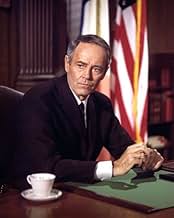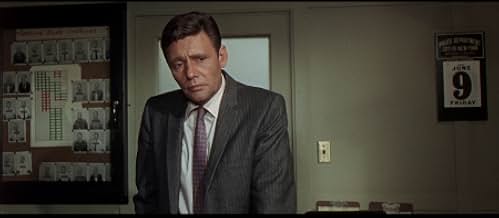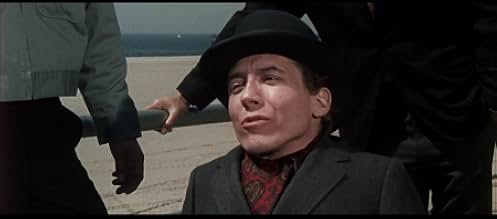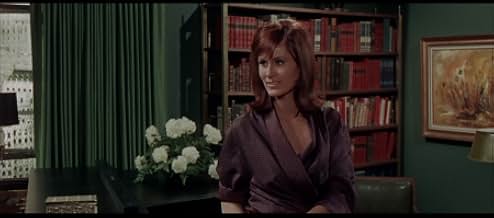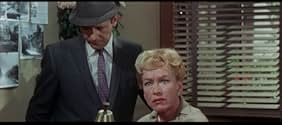NOTE IMDb
6,5/10
4,3 k
MA NOTE
Dans le Harlem espagnol de New York, les supérieurs des détectives Madigan et Bonaro leur ont donné 72 heures pour capturer un voyou recherché pour homicide à Brooklyn.Dans le Harlem espagnol de New York, les supérieurs des détectives Madigan et Bonaro leur ont donné 72 heures pour capturer un voyou recherché pour homicide à Brooklyn.Dans le Harlem espagnol de New York, les supérieurs des détectives Madigan et Bonaro leur ont donné 72 heures pour capturer un voyou recherché pour homicide à Brooklyn.
- Réalisation
- Scénario
- Casting principal
Avis à la une
A decent exploration of the maverick detective theme that Siegal would examine more successfully in "Dirty Harry." Richard Widmark is terrific in the title role, and the cinematography, along with some of the dialogue, is top notch. The film runs into problems, however, with the subplot involving police commissioner Henry Fonda, as well as Madigan's difficulties on the homefront with wife Inger Stevens. Had the emphasis remained on the manhunt conducted by Madigan and his partner (Harry Guardino), it could have been a classic. Instead, too much time is devoted to talk, and as any Siegal enthusiast knows, action is what he did best. The later TV series, again starring Widmark, is superior.
A fine, harshly realistic Don Siegel film from the late 60's with Richard Widmark superb as Madigan. Steve Ihnat (from THE CHASE) is also a perfect twisted and aggressive villain with able support from Harry Guardino. The lovely Inger Stevens is touching in one of her last roles before her untimely demise.
A 7 out of 10. Best performance = Steve Ihnat (who died too young). Don Siegel made a lot of good films and this is near the top of the list. One of the pro-cop films before Dirty Harry blasted it open. Once again, Inger Stevens will break your heart near the end of this and she never looked more beautiful in her all too short career. Well worth anyone's time.
A 7 out of 10. Best performance = Steve Ihnat (who died too young). Don Siegel made a lot of good films and this is near the top of the list. One of the pro-cop films before Dirty Harry blasted it open. Once again, Inger Stevens will break your heart near the end of this and she never looked more beautiful in her all too short career. Well worth anyone's time.
Madigan is directed by Don Siegel and adapted to screenplay by Abraham Polonsky and Howard Rodman from the novel The Commissioner written by Richard Dougherty. It stars Richard Widmark, Henry Fonda, Inger Stevens, Susan Clark, Harry Guardino and James Whitmore. Music is scored by Don Costa and cinematography by Russell Metty.
Plot finds Widmark as Detective Daniel Madigan, who along with his partner Rocco Bonaro (Guardino), loses a suspected murderer who also makes off with their guns. Causing embarrassment to Police Commissioner Anthony Russell (Fonda), who is hardly a fan of Madigan's methods, they are given 72 hours in which to locate the escapee and bring him in. But as the two men go in search of the crim, Commissioner Russell has various other problems to address, both at work and with matters of the heart. Last thing he needs is a volatile Madigan screwing things up...
Based on a book called The Commissioner, a film originally titled the same, and the most interesting story thread in the picture is that of Henry Fonda's Commissioner! Then why is the film called Madigan, who is an interesting character that really is only second fiddle in this particular Don Siegel orchestra? It is one of the odd and frustrating things about the piece, the story is complex enough without being unsure who to focus on, a shame because Widmark, Clark, Fonda and Whitmore are doing sterling work for their under pressure director (Siegel was constantly fighting with producer Frank P. Rosenberg).
The themes at play are deliciously enticing, infidelity, police corruption, family strife, friendship, loneliness and identity etc etc, threads are dangled and given thoughtful dialogue passages. But hang on! Wasn't there a murderer on the loose at the beginning of the film? Half way through the piece I had forgotten about Steve Ihnat's crim that opened up proceedings, surely that can't be right? Film looks terrific at day time, though, where Metty's bold Technicolor photography really gives the New York locations a sense of 70s wonder (I know it's a 60s movie but it feels very 70s, and in a good way as well), though Costa's score is far too blunderbuss for narrative themes.
It's a mixed bag, a film you just know should be better considering the talent in front of and behind the cameras. Ideas at core are strong and worthy of filmic adaptation, while the last quarter is electrifying and crowned by a classic foray into film noir territory. But really this is recommended as just above average entertainment for the cop/crime movie fan. 6/10
Plot finds Widmark as Detective Daniel Madigan, who along with his partner Rocco Bonaro (Guardino), loses a suspected murderer who also makes off with their guns. Causing embarrassment to Police Commissioner Anthony Russell (Fonda), who is hardly a fan of Madigan's methods, they are given 72 hours in which to locate the escapee and bring him in. But as the two men go in search of the crim, Commissioner Russell has various other problems to address, both at work and with matters of the heart. Last thing he needs is a volatile Madigan screwing things up...
Based on a book called The Commissioner, a film originally titled the same, and the most interesting story thread in the picture is that of Henry Fonda's Commissioner! Then why is the film called Madigan, who is an interesting character that really is only second fiddle in this particular Don Siegel orchestra? It is one of the odd and frustrating things about the piece, the story is complex enough without being unsure who to focus on, a shame because Widmark, Clark, Fonda and Whitmore are doing sterling work for their under pressure director (Siegel was constantly fighting with producer Frank P. Rosenberg).
The themes at play are deliciously enticing, infidelity, police corruption, family strife, friendship, loneliness and identity etc etc, threads are dangled and given thoughtful dialogue passages. But hang on! Wasn't there a murderer on the loose at the beginning of the film? Half way through the piece I had forgotten about Steve Ihnat's crim that opened up proceedings, surely that can't be right? Film looks terrific at day time, though, where Metty's bold Technicolor photography really gives the New York locations a sense of 70s wonder (I know it's a 60s movie but it feels very 70s, and in a good way as well), though Costa's score is far too blunderbuss for narrative themes.
It's a mixed bag, a film you just know should be better considering the talent in front of and behind the cameras. Ideas at core are strong and worthy of filmic adaptation, while the last quarter is electrifying and crowned by a classic foray into film noir territory. But really this is recommended as just above average entertainment for the cop/crime movie fan. 6/10
Detective Daniel Madigan (the excellent Richard Widmark) is very efficient and experienced, but also has no ethics. His partner, Detective Rocco Bonaro (Harry Guardino), and him go to a hotel room for the simple arrest of the small-time bandit Barney Benesch (Steve Ihnat). Madigan is reckless and in a lack of attention on Benesch, he reacts, takes the guns of the detectives and escapes. When back to the precinct, they receive the information that Benesch is a killer. Commissioner Anthony X.Russel (Henry Fonda), a very rigid and moralist man, gives a schedule of three days maximum for the detectives to arrest Benesch. Yesterday it was the first time that I watched this excellent police-drama movie. In the present days, this movie is politically incorrect: Madigan has no ethics, most of the characters have affair with lovers, smoking is `in', the interrogation is rough without human rights, and this is one of the greatest points of this film, since it is very real. Further, Don Siegel does not need car chases, explosions and other special effects to hook the attention of the viewer. The direction, screenplay and performance of the actors and actresses are more than enough to satisfy the viewer. The characters are very well developed and the scenes are very realistic. Again, an excellent police-drama movie recommended for those who like police story. My vote is eight.
Title (Brazil): ` Os Impiedosos' (`The Unmerciful')
Title (Brazil): ` Os Impiedosos' (`The Unmerciful')
This is a very "late '60s" detective drama, and if you're in the mood, it will hit the spot.
What struck me, and it has not been picked up by other posters, is the very visible difference between the majority of the scenes, shot on authentic NYC locations, and a few scenes straight from the Universal backlot, on urbanistically nonsensical streets with no gutters.
The studio shot scenes (and the school-of-Lalo-Shifrin score) increase the impression that you are watching a first class TV movie. It all makes you hungry for a dinner in a foil tray.
Definitely entertaining, in a period way.
What struck me, and it has not been picked up by other posters, is the very visible difference between the majority of the scenes, shot on authentic NYC locations, and a few scenes straight from the Universal backlot, on urbanistically nonsensical streets with no gutters.
The studio shot scenes (and the school-of-Lalo-Shifrin score) increase the impression that you are watching a first class TV movie. It all makes you hungry for a dinner in a foil tray.
Definitely entertaining, in a period way.
Le saviez-vous
- AnecdotesAfter years of rejecting offers to star in a TV series, Richard Widmark finally succumbed to Universal and NBC-TV's offer for a series. The pilot, La dernière enquête (1973). was rejected, however, and Widmark was asked to play Madigan in a segment of the NBC Wednesday Mystery Movie during the 1972-73 season. The series was canceled after one season despite usually finishing in the top 30 of the Nielsen ratings.
- GaffesWhen the killer is located in a hotel room, the police mass in view of the window rather than around the other side of the building. Then while the killer is firing from the window the assault group run into the building on the side under fire from the window. They evacuate the floor of the killer's room well after the first shots are exchanged and no police are watching the door to prevent escape.
- Citations
Commissioner Anthony X. Russell: [after Kane drops his shield on Russell's desk] What am I supposed to do with that?
Chief Inspector Charles Kane: Commissioner, I thought you'd never ask.
- ConnexionsFeatured in Mask (1985)
Meilleurs choix
Connectez-vous pour évaluer et suivre la liste de favoris afin de recevoir des recommandations personnalisées
- How long is Madigan?Alimenté par Alexa
Détails
- Date de sortie
- Pays d’origine
- Langue
- Aussi connu sous le nom de
- Madigan (Police sur la ville)
- Lieux de tournage
- 107 East 98th Street, Manhattan, Ville de New York, New York, États-Unis(Barney Benesch's sleazy residence; area of first chase scene)
- Société de production
- Voir plus de crédits d'entreprise sur IMDbPro
- Durée
- 1h 41min(101 min)
- Couleur
- Rapport de forme
- 2.35 : 1
Contribuer à cette page
Suggérer une modification ou ajouter du contenu manquant


